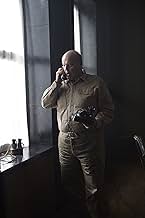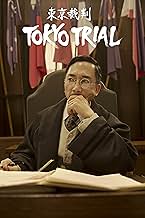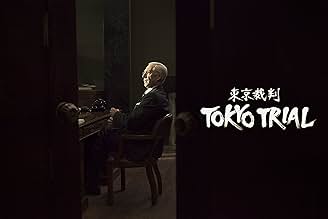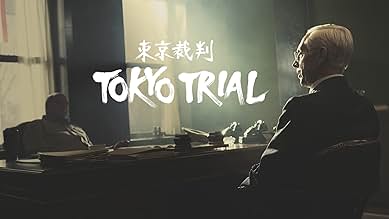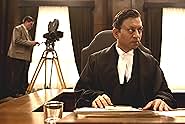Tokyo Trial
- Minissérie de televisão
- 2016
- 50 min
AVALIAÇÃO DA IMDb
7,3/10
2,1 mil
SUA AVALIAÇÃO
Adicionar um enredo no seu idiomaA historical drama that focuses on a decade-long investigation into events in the Pacific during and after WWII.A historical drama that focuses on a decade-long investigation into events in the Pacific during and after WWII.A historical drama that focuses on a decade-long investigation into events in the Pacific during and after WWII.
- Prêmios
- 1 vitória e 1 indicação no total
Explorar episódios
Avaliações em destaque
A great series , a must for historians and legal professionals and of course students and general public. Discussion of judges in their chamber, over different legal principles and appreciation and marshalling of evidence. As a judge I found this series excellent. Irfan Khan as Justice Radhabinod Pal incomparable. He adhered to the principles of criminal law and we saw the way of tribunal as they delivered judgement in th majority of 14 to one ,The line dissenter is yes Justice Radhabinod Pal.
I've spent half a century as a professional historian and thirty as an international criminal lawyer studying, recording and engaged in commentaries on the history and jurisprudence of the International Military Tribunal for the Far East. I've also closely studied the records of many, many hundreds of national war crimes trials that followed the Far East and Pacific Conflict, plus other national and international war crimes trials elsewhere from the late nineteenth century to more recent times. The 2 1/2 year Tokyo Trial (IMTFE) was much longer, more complex and covered a more extended period of events than its nine-month international counterpart at Nuremberg. Both of these two trials, however, were 'Class A' war crimes trials, meaning that their central focus was on an alleged conspiracy to plan, prepare, initiate and wage wars of aggression ("Crimes against Peace"). There was plenty on 'Class B/C" offences (violations of the laws and usages of war ("War Crimes" in the usual sense of atrocities against the laws and usages of war) and upon 'Crimes against Humanity' against civilians, but the bulk of those offences were tried in the so-called Minor War Crimes Trials that were held by individual countries and generally in the countries where those crimes had taken place. Only Nuremberg also dealt with Genocide.
This film concentrates on what was considered even at the time as the most important issue, what was called 'the master crime', Crimes against Peace, not only because that was the one thing that set Class A cases apart from others but because there was a deeply flawed general theory that without an aggressive war the other kinds of offences couldn't take place on an organised or systematic basis. But in a more particular sense the importance of this film is that it focusses on the very legality of having a trial concerning 'Crimes against Peace' which behind the scene was questioned by the judges at the Tokyo Trial in ways that didn't gain any traction at all at Nuremberg. The Judges at Nuremberg agreed never to discuss how their deliberations proceeded and how the trial almost collapsed due to the divisions between them. And this is the first time that their struggles over that issue have been aired in a major international film production. what is clear is that they understood that if the view held by the majority did not prevail, all that was achieved at Nuremberg in holding individuals criminally responsible for planning, preparing, initiating and waging wars of aggression would have fallen apart as a new rule of international law. If the couple of dozen defendants in the Tokyo Trial had to pay an heavy price in the process of turning a rule intended to bind states into a rule fit for holding individual leaders criminally responsible even to the point of losing their lives, then that ex post facto lawmaking was considered justifiable by the majority of members of the Tribunal. For others, that was a bridge too far.
Did the majority do the right thing? Judge for yourself. But did the upholding of the Nuremberg precedent really change the world as hoped? Sadly, no: the International Criminal Court has yet to claim its jurisdiction to try such cases. The architects of the most significant post-1945 aggressive wars have escaped justice, not least in the lands of those Members of the Tokyo Tribunal who were most keen to see that jurisdiction bedded down in national and international trials and in the conduct of states towards each other. As for the acting, the direction, the script and the fairness of this account: the film is awesome and as completely accurate as it is possible to be. This mini-series is a masterpiece.
This film concentrates on what was considered even at the time as the most important issue, what was called 'the master crime', Crimes against Peace, not only because that was the one thing that set Class A cases apart from others but because there was a deeply flawed general theory that without an aggressive war the other kinds of offences couldn't take place on an organised or systematic basis. But in a more particular sense the importance of this film is that it focusses on the very legality of having a trial concerning 'Crimes against Peace' which behind the scene was questioned by the judges at the Tokyo Trial in ways that didn't gain any traction at all at Nuremberg. The Judges at Nuremberg agreed never to discuss how their deliberations proceeded and how the trial almost collapsed due to the divisions between them. And this is the first time that their struggles over that issue have been aired in a major international film production. what is clear is that they understood that if the view held by the majority did not prevail, all that was achieved at Nuremberg in holding individuals criminally responsible for planning, preparing, initiating and waging wars of aggression would have fallen apart as a new rule of international law. If the couple of dozen defendants in the Tokyo Trial had to pay an heavy price in the process of turning a rule intended to bind states into a rule fit for holding individual leaders criminally responsible even to the point of losing their lives, then that ex post facto lawmaking was considered justifiable by the majority of members of the Tribunal. For others, that was a bridge too far.
Did the majority do the right thing? Judge for yourself. But did the upholding of the Nuremberg precedent really change the world as hoped? Sadly, no: the International Criminal Court has yet to claim its jurisdiction to try such cases. The architects of the most significant post-1945 aggressive wars have escaped justice, not least in the lands of those Members of the Tokyo Tribunal who were most keen to see that jurisdiction bedded down in national and international trials and in the conduct of states towards each other. As for the acting, the direction, the script and the fairness of this account: the film is awesome and as completely accurate as it is possible to be. This mini-series is a masterpiece.
10rps-2
With so much mindless fluff on television, how great it is to see a serious and superbly done docudrama. Tokyo Trial covers the legal and political battles that were bitterly fought behind closed doors for two years after the Japanese surrender. The tribunal wrestled with the issue of whether Japanese leaders could be punished for aggression when there really was no law against aggression and whether the Japanese incursion into China was really any different from the British in India or the Americans' genocide of their native population. We are privy to some superb behind the scenes legal discussions. The series exudes honesty and accuracy. It uses one very effective technique. The scenes in the courtroom are shown in newsreel style black and white while the dialogue is heard in the tinny, halting voice of the translator. Most effective! The various judges are brilliantly drawn. Each is a unique personality. The clothing, the accents, even the body language, are all carefully presented and give the series a genuine " slice of the past" quality that few films achieve. I sometimes despair that we use our amazing video technology for trivialities and trash. This series shows what television can accomplish but so seldom does.
Good history, fine acting. The moral nuances become very real as the Justices deliberate. I expect my attorney friends will really like this. For the most part the film succeeds in avoiding black and white characters and draws out the complexities of personalities and values. This is not a thriller, more of a morality play based on real high-stakes deliberations. The casting for General MacArthur was a minus, not because of the acting, there was little meat in the role, but there must be thousands of actors who would look like MacArthur and could handle this role. No one else's likeness was relevant, who knew the judges? But...
Not for the impatient, this 4 part series is designed for viewers who are willing to listen to everything that is said.
Ideas about atrocities, crimes against humanity, and what is acceptable in war-making are presented throughout. Always in the background: the Nuremberg Trials and how posterity will view the trial and the judges.
Production values are top-notch but never over the top. There's a very clever interpolation of actual courtroom newsreel footage with scenes from this show -- very good set and color matching.
This is a show about ideas and about how the winners view morality and their roles in defining what is and is not acceptable in warfare.
Recommended.
Ideas about atrocities, crimes against humanity, and what is acceptable in war-making are presented throughout. Always in the background: the Nuremberg Trials and how posterity will view the trial and the judges.
Production values are top-notch but never over the top. There's a very clever interpolation of actual courtroom newsreel footage with scenes from this show -- very good set and color matching.
This is a show about ideas and about how the winners view morality and their roles in defining what is and is not acceptable in warfare.
Recommended.
Você sabia?
- CuriosidadesAll the furniture in the courtroom, hotel and restaurant sets were custom-built replicas made by the art and construction departments for use on the production in order for everything to look authentic.
- Erros de gravaçãoMajor General Cramer, Judge Advocate General (JAG) of the United States Army, is wearing the Corps of Engineers branch insignia instead of the JAG branch insignia.
- ConexõesEdited into Tokyo Trial (2017)
Principais escolhas
Faça login para avaliar e ver a lista de recomendações personalizadas
- How many seasons does Tokyo Trial have?Fornecido pela Alexa
Detalhes
- Data de lançamento
- Países de origem
- Central de atendimento oficial
- Idiomas
- Também conhecido como
- Токийский процесс
- Locações de filme
- Didziasalis, Ignalina District Municipality, Lituânia(Post War Tokyo)
- Empresas de produção
- Consulte mais créditos da empresa na IMDbPro
Contribua para esta página
Sugerir uma alteração ou adicionar conteúdo ausente


